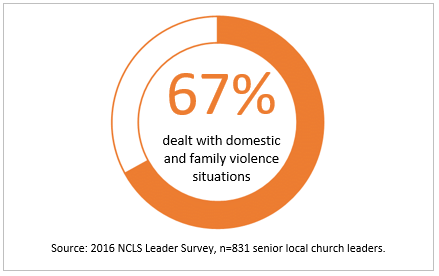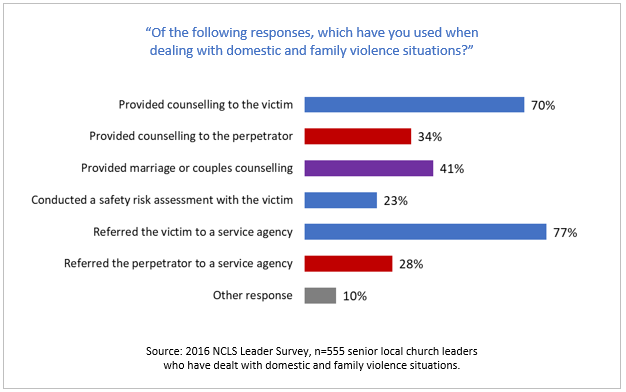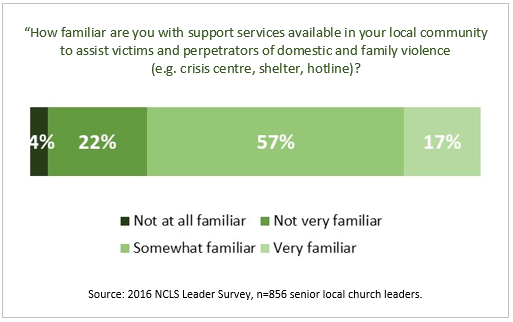Domestic and Family Violence (DFV) is a serious and widespread problem in Australia. It occurs in all communities, including communities of faith. Victims are predominantly women and children.
Churches can provide trusted relationships and various forms of support – pastoral, material, spiritual – to those who are experiencing violence, or who have previously experienced it. Clergy, leaders and friends at church may be called on by attenders for help.
Most Australian clergy have experience with domestic and family violence situations. Results from the 2016 National Church Life Survey show how they have responded.
Most Australian clergy have dealt with DFV situations

Two thirds of senior local church leaders who participated in the 2016 NCLS reported dealing with DFV situations. The likelihood of doing so increased with age, up to age 40. Half of senior leaders aged under 40 had dealt with DFV situations (49%), compared with 67% of those in their 40s, 71% of those in their 50s, and 72% of those aged 60 and over.
Clergy have mainly responded to victims of abuse, rather than to perpetrators

Most senior leaders referred victims to specialist services and counselled them, while fewer conducted safety risk assessments with victims. A large minority counselled and/or referred perpetrators.
Some four in 10 provided marriage or couples counselling in relation to DFV situations. Couples counselling is problematic. Victims of domestic violence, and services that support them, maintain that couples counselling is ineffective and unsafe as it fails to address the unequal power in an abusive relationship and can place the victim at increased risk.
One in six clergy considered themselves to be very familiar with DFV support services

Forming bridges between churches and specialist DFV support services is an important way to equip clergy to better respond to DFV. While around three-quarters of senior leaders considered themselves to be familiar with local DFV support services at least to some degree (somewhat or very familiar), just one in six considered themselves to be very familiar.
Note: Results are based on n=883 “senior local church leaders” (ministers, pastors or priests who are the primary or senior leader of a local church or who have equal standing in the ministry team, as well as laypeople serving as the principal leader in a local church) who participated in the 2016 NCLS. Some 96.5% are clergy. Data are weighted to correct for differences in participation across denominations. Some 14 denominations and movements are included in the analysis, accounting for 89% of the estimated number of senior local church leaders in Australia (not including Orthodox, independent or house churches).
See full paper:
Pepper, Miriam, and Ruth Powell. 2022. "Domestic and Family Violence: Responses and Approaches across the Australian Churches" Religions 13, no. 3: 270. https://doi.org/10.3390/rel13030270
Denominational Responses
Further reading
The full domestic and family violence results from the 2016 National Church Life Survey have been published in a peer-reviewed paper in the academic journal 'Religions'. Access the paper here
National Council of Churches listing of domestic and family violence resources: https://www.ncca.org.au/safe-church-program/domestic-and-family-violence
National Anglican Family Violence Project: https://anglican.org.au/our-work/family-violence/
About domestic and family violence: https://www.1800respect.org.au/violence-and-abuse



